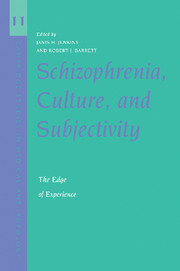Book contents
- Frontmatter
- Contents
- Contributors
- Preface
- Acknowledgments
- Schizophrenia, Culture, and Subjectivity
- Introduction
- Part 1 Culture, Self, and Experience
- Part 2 Four Approaches for Investigating the Experience of Schizophrenia
- Part 3 Subjectivity and Emotion
- 10 Madness in Zanzibar: An Exploration of Lived Experience
- 11 Subject/Subjectivities in Dispute: The Poetics, Politics, and Performance of First-Person Narratives of People with Schizophrenia
- 12 “Negative Symptoms,” Commonsense, and Cultural Disembedding in the Modern Age
- 13 Subjective Experience of Emotion in Schizophrenia
- Index
- References
12 - “Negative Symptoms,” Commonsense, and Cultural Disembedding in the Modern Age
Published online by Cambridge University Press: 25 January 2010
- Frontmatter
- Contents
- Contributors
- Preface
- Acknowledgments
- Schizophrenia, Culture, and Subjectivity
- Introduction
- Part 1 Culture, Self, and Experience
- Part 2 Four Approaches for Investigating the Experience of Schizophrenia
- Part 3 Subjectivity and Emotion
- 10 Madness in Zanzibar: An Exploration of Lived Experience
- 11 Subject/Subjectivities in Dispute: The Poetics, Politics, and Performance of First-Person Narratives of People with Schizophrenia
- 12 “Negative Symptoms,” Commonsense, and Cultural Disembedding in the Modern Age
- 13 Subjective Experience of Emotion in Schizophrenia
- Index
- References
Summary
Introduction
Psychiatric attention in the last decade or more has focused increasingly on the so-called “negative symptoms” of schizophrenia – symptoms defined by diminishment of normal forms of behavior or expression. The symptoms in question include flatness of affective expression, paucity of speech, a lack of socially directed behavior, and an apparent apathy and lack of sustained attentiveness particularly to people or the environment. For various reasons, both the subjective and the cultural dimensions of these symptoms have been neglected or even denied.
It is sometimes claimed that the concept of “negative symptoms” is perfectly atheoretical, merely a convenient way of classifying symptoms. Often, however, negative symptoms have been understood to represent a fundamental diminishment of psychological activity or subjective life, especially of the higher mental processes involving volition, self-awareness, reasoning, abstraction, and complex emotional response. This is congruent with the original conceptualization of negative versus positive symptoms that was offered toward the end of the nineteenth century by Hughlings Jackson and his followers: “In every insanity,” wrote Jackson (1932:411, quoted in Foucault 1987:19), “more or less of the highest cerebral centers is out of function, temporarily or permanently, from some pathological process.” Wrote Jackson's disciple, Charles Mercier, “The affection of function is always in the direction of loss, of deficit, or diminution … degradation of action to a lower plane” (Clark 1981:284).
- Type
- Chapter
- Information
- Schizophrenia, Culture, and SubjectivityThe Edge of Experience, pp. 303 - 328Publisher: Cambridge University PressPrint publication year: 2003



